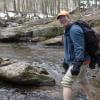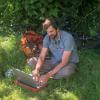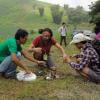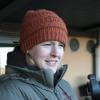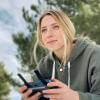With new technologies revolutionizing data collection, wildlife researchers are becoming increasingly able to collect data at much higher volumes than ever before. Now we are facing the challenges of putting this information to use, bringing the science of big data into the conservation arena. With the help of machine learning tools, this area holds immense potential for conservation practices. The applications range from online trafficking alerts to species-specific early warning systems to efficient movement and biodiversity monitoring and beyond.
However, the process of building effective machine learning tools depends upon large amounts of standardized training data, and conservationists currently lack an established system for standardization. How to best develop such a system and incentivize data sharing are questions at the forefront of this work. There are currently multiple AI-based conservation initiatives, including Wildlife Insights and WildBook, that are pioneering applications on this front.
This group is the perfect place to ask all your AI-related questions, no matter your skill level or previous familiarity! You'll find resources, meet other members with similar questions and experts who can answer them, and engage in exciting collaborative opportunities together.
Just getting started with AI in conservation? Check out our introduction tutorial, How Do I Train My First Machine Learning Model? with Daniel Situnayake, and our Virtual Meetup on Big Data. If you're coming from the more technical side of AI/ML, Sara Beery runs an AI for Conservation slack channel that might be of interest. Message her for an invite.
Header Image: Dr Claire Burke / @CBurkeSci

Explore the Basics: AI
Understanding the possibilities for incorporating new technology into your work can feel overwhelming. With so many tools available, so many resources to keep up with, and so many innovative projects happening around the world and in our community, it's easy to lose sight of how and why these new technologies matter, and how they can be practically applied to your projects.
Machine learning has huge potential in conservation tech, and its applications are growing every day! But the tradeoff of that potential is a big learning curve - or so it seems to those starting out with this powerful tool!
To help you explore the potential of AI (and prepare for some of our upcoming AI-themed events!), we've compiled simple, key resources, conversations, and videos to highlight the possibilities:
Three Resources for Beginners:
- Everything I know about Machine Learning and Camera Traps, Dan Morris | Resource library, camera traps, machine learning
- Using Computer Vision to Protect Endangered Species, Kasim Rafiq | Machine learning, data analysis, big cats
- Resource: WildID | WildID
Three Forum Threads for Beginners:
- I made an open-source tool to help you sort camera trap images | Petar Gyurov, Camera Traps
- Batch / Automated Cloud Processing | Chris Nicolas, Acoustic Monitoring
- Looking for help with camera trapping for Jaguars: Software for species ID and database building | Carmina Gutierrez, AI for Conservation
Three Tutorials for Beginners:
- How do I get started using machine learning for my camera traps? | Sara Beery, Tech Tutors
- How do I train my first machine learning model? | Daniel Situnayake, Tech Tutors
- Big Data in Conservation | Dave Thau, Dan Morris, Sarah Davidson, Virtual Meetups
Want to know more about AI, or have your specific machine learning questions answered by experts in the WILDLABS community? Make sure you join the conversation in our AI for Conservation group!
No showcases have been added to this group yet.
- 0 Resources
- 0 Discussions
- 5 Groups
- 0 Resources
- 0 Discussions
- 5 Groups
Vulcan
I'm a Geospatial Data Scientist that uses data to solve wildlife problems.
- 0 Resources
- 0 Discussions
- 5 Groups
fistlabs
Electrical & Software Engineer
- 0 Resources
- 2 Discussions
- 4 Groups
- 0 Resources
- 0 Discussions
- 2 Groups
Not yet active in conservation. Finishing my data science studies and working on a theoratical foundation on ecology and conservation
- 0 Resources
- 0 Discussions
- 2 Groups
NOAA Fisheries
Research Oceanographer with NOAA Fisheries in Hawaii
- 0 Resources
- 1 Discussions
- 2 Groups
Wild Me
Engineer at Wild Me, a software platform for wildlife computer vision and citizen science.
- 0 Resources
- 1 Discussions
- 1 Groups
Master student looking at monitoring biodiversity in urban green spaces
- 0 Resources
- 0 Discussions
- 10 Groups
- 0 Resources
- 0 Discussions
- 1 Groups
- 0 Resources
- 0 Discussions
- 6 Groups
- 0 Resources
- 1 Discussions
- 4 Groups
Join us in celebrating this year’s Judging Panele Award winners!
19 August 2024
Vote for your favorite submissions that best demonstrate conservation impact, novel innovation/discovery, and strong storytelling of the work and the sector.
12 August 2024
Climate Change AI calls for applications for Innovation Grants regarding AI/ML research projects. Eligible applicants are principal investigators at accredited universities in OECD member countries.
12 August 2024
In this post, I describe an animal recognition demonstration app I developed for the iPhone. The “MegaDetector-Demo” app uses the latest “MegaDetector” animal detector model from PyTorch-Wildlife to identify animals,...
11 August 2024
To celebrate our 9th Annual #Tech4Wildlife Photo Challenge happening this week, we’re taking a look at past and current submissions that feature the fastest growing areas of conservation tech: movement ecology, AI,...
7 August 2024
We are thrilled to introduce our new horizon scan, which will chart the future of bioacoustics. By collectively prioritizing emerging innovations that could transform the field, we aim to build consensus, facilitate...
5 August 2024
Hi all, I've published a blog post on rapidly labeling camera trap data using ChatGPT for species identification and a simple object detection model to get the bounding boxes. While presented in Edge Impulse, this...
17 July 2024
We are recruiting an (extendable) 2-year postdoc in my group to develop new technologies (cameras, microphones, deep learning, etc) to track earthworm activity in the field.
16 July 2024
The Reversing Environmental Degradation in Africa and Asia (REDAA) Programme is seeking a consultant to look into current issues with AI to develop a better shared understanding of how AI and related technologies could...
11 July 2024
Aerial seeding with drones has great potential in forest restoration but faces enormous challenges to be efficient and scalable. Current protocols use blanket seeding throughout the area to be restored, meaning a high...
20 June 2024
Come join us at AIMS, and work on deep learning for bioacoustics research!
14 June 2024
September 2025
event
event
event
event
October 2025
event
event
event
December 2025
event
March 2026
83 Products
Recently updated products
17 Products
Recently updated products
| Description | Activity | Replies | Groups | Updated |
|---|---|---|---|---|
| This morning at 06:08 local time, the polar bear detector that Lars Holst Hansen and Kim Hendrikse from Wildlife Security Solutions have... |
|
AI for Conservation, Camera Traps, Edge Computing | 19 hours 36 minutes ago | |
| Thanks! |
+7
|
AI for Conservation, Autonomous Camera Traps for Insects, Camera Traps, Edge Computing | 18 hours 8 minutes ago | |
| Hey Alejandro, thanks for trying it! :))The feature you are asking about is called in technical language - animal re-identification. Unfortunately, we currently don't have this... |
|
AI for Conservation, Camera Traps, Data Management & Mobilisation, Software Development | 21 hours 30 minutes ago | |
| Very inspiring! I completely agree that AI should help free conservationists from repetitive tasks so they can focus on strategy and fieldwork. In our IDEPROCONA project in... |
|
AI for Conservation | 1 day 20 hours ago | |
| I create ocean exploration and marine life content on YouTube, whether it be recording nautilus on BRUVs, swimming with endangered bowmouth... |
|
Acoustics, AI for Conservation, Animal Movement, Camera Traps, Citizen Science, Drones, Emerging Tech, Marine Conservation, Sensors, Sustainable Fishing Challenges, Wildlife Crime | 1 month 3 weeks ago | |
| I think it is time for exploring many AI s application around our careers and projects. With waste management too! this is also very interesting |
|
AI for Conservation | 3 days 1 hour ago | |
| Hey people of the world. 10 days ago I posted here about our new GUI tool where one could drag-n-drop an image and get animals detected on... |
|
AI for Conservation | 1 week 1 day ago | |
| Hi @CourtneyShuert We support NOAA with AI for individual ID for belugas (but from aerial and from lateral surface too). If some of our techniques can be cross-applied... |
|
AI for Conservation, Data Management & Mobilisation | 1 week 6 days ago | |
| Kudos for such an innovative approach—integrating additional sensors with acoustic recorders is a brilliant step forward! I'm especially interested in how you tackle energy... |
|
Acoustics, AI for Conservation, Latin America Community, Open Source Solutions | 2 weeks ago | |
| Thank you for your reply! It surely helps, we have use exif for a while to read metadata from images, when there is information available. Could be nice to maybe see if we... |
|
AI for Conservation, Camera Traps | 2 weeks 3 days ago | |
| You could just throw out that data, but I think you'd be doing yourself a disservice and missing out on some interesting insights. Are you training the AI with just pre-COVID... |
|
AI for Conservation, Animal Movement, Data Management & Mobilisation, Human-Wildlife Coexistence | 2 weeks 6 days ago | |
| Would love to collaborate on this we are curently building agents for conservation Kind regardsOlivier |
|
AI for Conservation, Community Base | 3 weeks ago |








